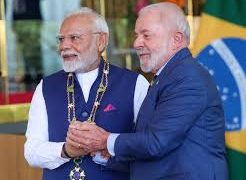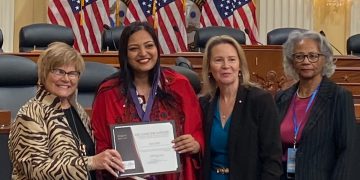Arooj Aftab ignited a social media debate when she expressed her frustration with being solely labeled as a ‘Pakistani’ or ‘Urdu’ artist. The Grammy-winning singer questioned whether artists of color would ever be able to escape generic categorization based on their heritage rather than their music.
Taking to Twitter on Saturday, Arooj shared her thoughts, saying, “Pakistani singer Arooj Aftab, Urdu singer Arooj Aftab, Arooj Aftab’s amazing Urdu singing… like, it’s fine I guess? But can a person of color musician ever just get to be without this tag to whatever someone else is presuming is our root or heritage? Yes, can I make contemporary music in peace?”
Arooj’s tweet received a mixed response, reflecting conflicting perspectives on the issue. Some fans empathized with her, acknowledging that regardless of her accomplishments, she would always be seen primarily through the lens of her Pakistani heritage. One user encouraged her to embrace her roots, suggesting that the cultural tag could serve as a source of strength and motivation in her artistic journey.
Another user related to Arooj’s stance, noting the familiar struggle against being labeled and boxed in. However, there were also those who questioned her perspective, suggesting that if she truly disliked the association with her Pakistani roots, she should consider altering her repertoire. They argued that her choice to cover Urdu ghazals performed by iconic Pakistani artists contributed to the association she wished to distance herself from.
One user questioned her statement, emphasizing that being Pakistani and singing in Urdu were inherent aspects of her identity that couldn’t be denied. Another user pointed out that her claim to fame was winning a Grammy as the first Pakistani artist, and it seemed contradictory for her to now feel weighed down by the associated tag.
Amid the backlash, Ms Aftab responded, expressing her frustration at being accused of being “anti-Pakistani.” She clarified that she did not seek to erase or disown her roots and heritage but rather aimed to push back against the limitations of being solely confined within a specific cultural and linguistic context.
While the Grammy winner’s frustrations are valid, it’s important to acknowledge and appreciate her accomplishments, such as her Grammy win, which showcased her talent and the richness of Pakistani music and the Urdu language to a global audience. Fans believe it’s crucial to strike a balance between embracing diverse cultural backgrounds and allowing artists the freedom to explore new territories and transcend predefined stereotypes.

















































